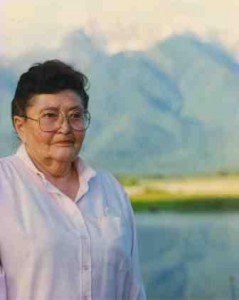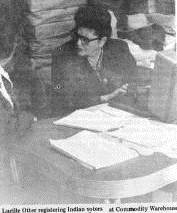
“Politics, one way or another, controls your destiny. Choose yours today,” read a 1974 announcement written by Lucille Otter on the front page of the confederated Salish, Kootenai and Pend d’Oreille tribes’ newspaper. Empowering tribal members to exercise their right to vote was one of the many ways Lucille Trosper Roullier Otter helped Indian people better their condition in life.
Lucille Trosper was born in 1916 on the Flathead Indian Reservation to Angeline McCloud, a member of the Salish tribe, and Belford Trosper. She grew up hunting and fishing with her brothers—activities that inspired her dedication to conservation efforts in the Flathead region. She graduated from Ronan High School in 1933. Although Lucille did exceptionally well in school, she did not attend college because her father objected.
Jobs were scarce in Montana during the Great Depression and nearly nonexistent on the reservation. “Life was terrible!” Lucille recalled. She worked briefly for the Works Progress Administration before being hired in 1934 to work at the Dixon headquarters of the Indian Division of the Civilian Conservation Corps, becoming the first woman to work in an administrative capacity in the Indian CCC. She was in charge of budgeting ICCC projects, keeping accounts, and overseeing payroll and purchase orders for the ICCC camps. The ICCC enrollees called her “buddy.”
“The CCC was a godsend for the reservation,” Lucille observed. Enrollees received training as communication radio operators, mechanics, and heavy equipment operators—skills they later used to find employment with telephone companies, on construction crews, on highway projects, and in industrial manufacturing.
Lucille donated much of her monthly salary to support her brothers’ college education in Missoula. That left next to nothing for her to live on, yet she remained self-supporting throughout the Depression, taking additional work as a records clerk and voter registrar at the BIA office on the reservation.
Lucille’s first husband, Phillip Rouiller, died in 1955, leaving her to raise their daughter, Renee, alone in an era of high unemployment on the reservation. Recalling how beneficial the Indian CCC had been for Indian people, Lucille, as a member of the Democratic Central Committee of Lake County, suggested to Montana Senator Lee Metcalf the creation of a reservation-based vocational training program similar to the Indian CCC. Metcalf responded with legislation that created the Kicking Horse Jobs Corps in Ronan in 1966.
Lucille’s greatest achievement, however, was empowering tribal members to vote. She was only eight years old when the Indian Citizenship Act of 1924 made all members of federally recognized tribes American citizens, ostensibly enfranchising them. Her mother set a precedent by being the first Indian woman on the reservation to register to vote. Adeline Trosper then became the first female juror in Lake County. It wasn’t until her mother’s death in 1960 that the importance of these “firsts” fully dawned on Lucille.
“I got to thinking how pitiful the Indians were in not voting,” she said. Heavily outnumbered by non-Indians, even on the reservation, the few Indians who did vote couldn’t influence elections, and elected officials seldom concerned themselves with Indian issues or the impact of legislation on Indian people. Part of the problem stemmed from efforts by the state to curtail the Indian vote. A 1932 amendment to Montana’s constitution permitted only tax-paying individuals to vote, thereby disenfranchising Indians who lived on, or derived income from, trust lands. Five years later, Montana prohibited individuals who did not pay local taxes from becoming local registrars, effectively suppressing Indian voter registration in reservation counties. By the time the Voting Rights Act passed in 1965 to remove these barriers, many tribal members had given up on trying to vote. Lucille Roullier set out to change this situation.

Her strategy at first was to register Indian women. “I really concentrated on the women, the mothers, because I thought they would encourage their children to vote. I went all over the reservation, to every residence.” She took time to teach each new voter how to fill out a ballot correctly so that their votes would count.
Many tribal elders, whose rights had been ignored so long by the government, wouldn’t vote even after she had registered them. Lucille persisted. “The Indians are going to be left in the dust if you don’t get a hold of what’s going on in our government,” she told those who wavered. When women complained that their husbands didn’t want them at the polls, she showed them how to apply for absentee ballots.
Occasionally, Lucille, who remarried in 1969 to Laurence Otter, faced significant opposition to her efforts from some of the white residents on the Flathead Reservation, but that only motivated her to work harder. She set up registration tables at the commodity distribution warehouse, at local events, and in grocery stores. She carried extra registration cards in her car, and once, while out fishing, even registered a young woman on horseback.
Over time, Lucille Roullier Otter registered well over a thousand voters on the reservation. “I felt as though a tribal member should do something for the tribe, not to be a taker, but to be a giver. I spent a lot of money on gas, and time, but it was worth it. And I renewed my friendships.”
In 1988, Salish Kootenai College awarded Lucille Roullier Otter an honorary degree, and in 1992 her daughter set up a scholarship at the college in her name. Many tribal members, including tribal council members and legislative representatives, attribute their political involvement to Lucille Otter, who admonished them, “For heaven’s sake, pay attention to what’s going on in this country! If you don’t get involved, we’re going down the river!” LKF
Interested in learning more? Other Indian women active in politics include Fort Peck’s Dolly Cusker Akers, the first Native American to serve in the Montana legislator. Read more here.
Sources
Knox, Margaret L. “The New Indian Wars: A Growing National Movement Is Gunning for Tribal Treaties, Reservations and Rights.” Los Angeles Times, November 7, 1993. Accessed October 21, 2013.
Laskowski, Jeannine, Jackie Drews, and Cynthia Kingston. “Women Making It Happen: Lucille Otter.” InterMountain Woman, October/November 1996, 40-43.
Lucille T. Otter interview, June 24, 1995. Small Collection 1623, Montana Historical Society Archives, Helena.
“Lucille Otter Laid to Rest.” Char-Koosta News, June 20, 1997, 1.
“Lucille Otter Rounding Up Tribal Votes.” Char-Koosta News, October 1, 1974, 5, 14.
Montana Human Rights Network. Drumming Up Resentment: The Anti-Indian Movement in Montana. N.p., January 2000, 4.
Otter, Lucille. “Circle June 6th on Your Calendar.” Char-Koosta News. June 1, 1978, 1.
Was thrilled to read about Lucille Otter! She was a friend of our family, and she impressed me with her energy and intellect even when I was a small
child. I had no idea about her hard work and accomplishments. She always
seemed to find time to turn an interested gaze on a blank faced kid like me,
and engage in conversation in a way that not only made me think, but made
me believe it was important that I did!